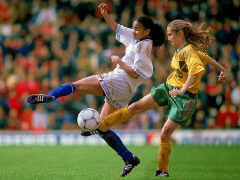|
|


|
|
Equal Opportunity
Coaching
by Allison Steele
Produced for the Web by Sarah Bronson
|

Photo
copyright Allsport Photography, Inc.
|
When classes
end for the day at North Jersey's Shore Regional High School,
most of the girls and boys in the hallways head for the locker
rooms. Gym bags slung over their shoulders, they move in mixed
groups, maybe talking about practice, their coaches, or the
upcoming game.
| An athletic
director told Williams, "I'll give you what the
law says, but I'll never believe you deserve it." |
Less
than half an hour later, students in sweats and spandex warm
up for practice on the perimeters of the playing fields, some
boys and some girls. Since most kids at Shore Regional play
sports, the ratio of boys to girls on the fields is about
equal, a fact the young athletes don't seem to notice one
way or the other.
Something
else they may not notice, however, is that the sidelines
tell a different story of post-Title IX progress. As coach
Nancy Williams can attest, women's sports have come a long
way since 1972. Williams is as legendary in the New Jersey
school system for her coaching success (her teams hold some
of the best records in the country) as she is for the controversy
she stirs up. Williams, who says she often must demand equal
treatment for her girls' teams, believes that Title IX still
has not done what it was meant to do, and she seems willing
to fight until it does.
"One thing you can't change by law is attitude," says Williams.
"As one of my former athletic directors said to me years
ago, 'I'll give you what the law says, but I'll never believe
you deserve it.'"
| "Men
didn't want to coach women's sports because the money
wasn't equal," said Williams. "After Title
IX, they started applying for those jobs." |
When Williams
was a student at Shore Regional in pre-Title IX days, the
only sport available to girls was cheerleading. Now, 34
years after her graduation, Williams coaches field hockey,
basketball, and softball at her alma mater, which now offers
several girls' teams each season. While the blossoming of
girls' sports programs is a clear, positive effect of Title
IX, Williams can see another, more subtle result.
"When I first started coaching, everyone I coached against
was female," says Williams, whose field hockey and softball
teams are often ranked the best in the nation. "Now there
are hardly any in basketball or softball. Certainly I never
used to see male coaches in field hockey, and now we're
seeing those, too."
Along with dugouts for girls' softball teams and shared
use of the main gym, another visible effect of Title IX,
Williams says, is the number of men now willing to coach
a team of girls. "Men didn't want to coach women's sports
because the money wasn't equal," says Williams. "After Title
IX, they started applying for those jobs. And the thing
is, [in 1972] many women didn't have the background and
experience with organized sports that men did."
NEXT:
Good News, Bad News>>
|
|
|
|
|
PAGE 2:
Good News, Bad News>>
PAGE 3:
"These are their girlfriends">>
PAGE
4:
Men Leading Women>>
PAGE
5:
A New Generation>>
|
|

Photo
copyright Allsport Photography, Inc.
|

